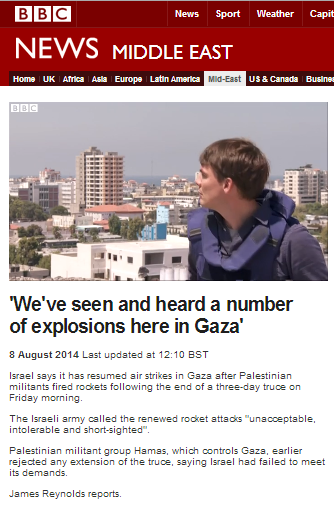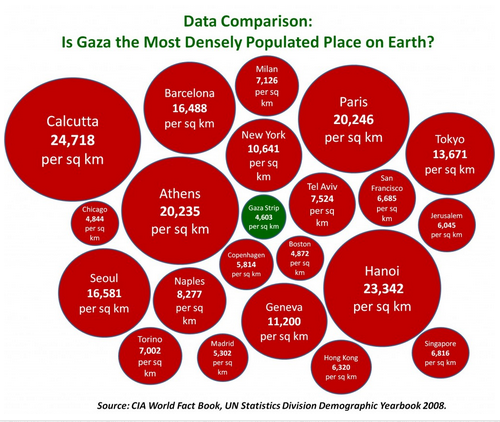There appears to be a degree of confusion at the BBC with regard to the topic of one of Hamas’ many demands put forward during the current negotiations in Cairo – the demand for a seaport in the Gaza Strip. There is, however, no uncertainty about promoting and amplifying that demand.
An article titled “Gaza ceasefire ends as Israel reports rocket fire” from August 8th states:
“Palestinian militant organisation Hamas has rejected any extension of the three-day ceasefire in Gaza, which expired on Friday morning.
It said that Israel had failed to meet its demands, including the re-opening of Gaza Harbour to shipping.”
In a filmed report from the same date (“‘We’ve seen and heard a number of explosions here in Gaza’” – notable too for its clear as mud portrayal of what preceded what on August 8th: missiles from the Gaza Strip or Israeli responses) James Reynolds stated:
“Hamas says it’s not yet got anything from those indirect negotiations…ah…in Cairo. It wants an end to Israeli restrictions and ability to use the ports of Gaza and ability…eh…to get people to come and go from the borders.” [emphasis added]
Despite James Reynolds’ use of the plural, there is one small port in the Gaza Strip, located in the Rimal district of Gaza City. Although some attempts to enlarge it were made in 2010 ahead of the ‘Mavi Marmara’ flotilla, the port remains incapable of receiving large vessels and so the accuracy of the BBC’s assertion that Hamas’ demands relate to “the re-opening of Gaza Harbour to shipping” are doubtful.
In fact, what Hamas does appear to be demanding according to most reports is the construction of a new and bigger seaport.
“According to sources close to Hamas, Palestinian envoys in Cairo continue to insist that the blockade on Gaza be fully lifted and that an agreement be reached over the establishment of seaports and airports and the opening of border crossings.”
“[Hamas official] Al-Rishiq said Hamas would continue insisting on an end to Israel’s siege on Gaza, the release of Shalit-deal prisoners whom Israel has re-arrested, the building a seaport and an airport in Gaza, and the creation of a safe passage between the West Bank and the Gaza Strip.”
The ‘Agreement on Movement and Access‘ signed by Israel and the Palestinian Authority in November 2005 after Israel’s withdrawal from the Gaza Strip included provisions for the construction of a new seaport in the Gaza Strip.
“Gaza Seaport
Construction of a seaport can commence. The GoI will undertake to assure donors that it will not interfere with operation of the port. The parties will establish a U.S.-led tripartite committee to develop security and other relevant arrangements for the port prior to its opening. The 3rd party model to be used at Rafah will provide the basis for this work.”
That project of course did not come to fruition because the party to the agreement – the Palestinian Authority – lost control of the Gaza Strip after the violent Hamas coup in 2007. Hamas of course does not honour existing agreements between Israel and the PA.
There are two notable points about the BBC’s amplification of this particular Hamas demand on August 8th, with the first being that Egypt had already apparently made it clear to Hamas that the topic of a seaport (and an airport) was off the table.
The second notable point is that the BBC makes no effort to explain to its audiences what this demand actually means: the end of Israel’s naval blockade on the Gaza Strip – introduced in January 2009 in response to Hamas terrorism. Neither is it clarified that there exists a very high likelihood that an open seaport under Hamas control would be used as a route for rearmament and entry of materials for the construction of yet more cross-border attack tunnels similar to the thirty-two recently decommissioned by the IDF.
Yet again, the BBC fails to meet its commitment to “build a global understanding of international issues”.
“The BBC’s journalism for international audiences should share the same values as its journalism for UK audiences: accuracy, impartiality and independence. International audiences should value BBC news and current affairs for providing reliable and unbiased information of relevance, range and depth.”
Israel, of course, cannot agree to an open access seaport run by an internationally designated terrorist organization committed to its destruction and supported and enabled by Iran. BBC audiences though will have no idea why.




